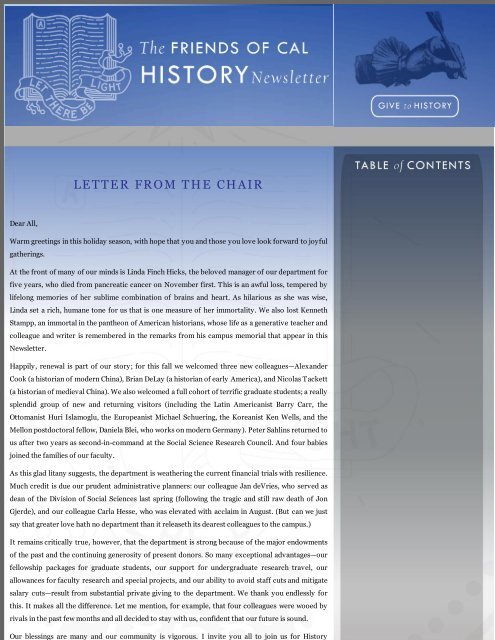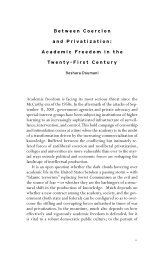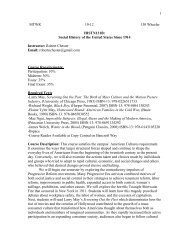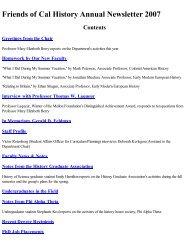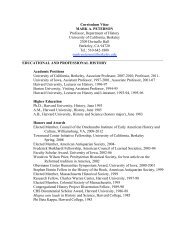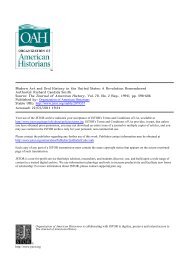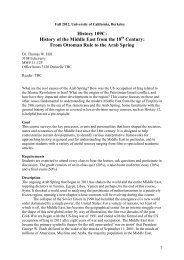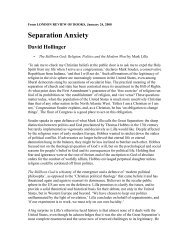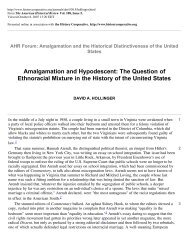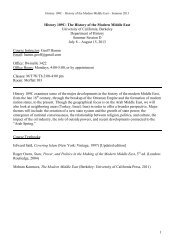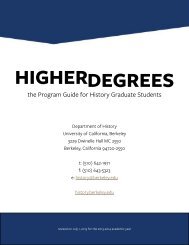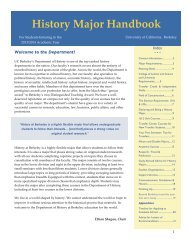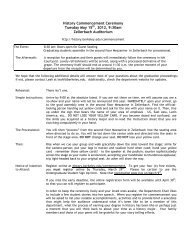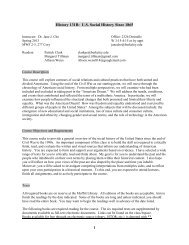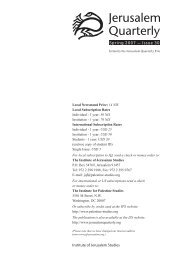Department of History_UCB_ Annual Newsletter 2010.pdf
Department of History_UCB_ Annual Newsletter 2010.pdf
Department of History_UCB_ Annual Newsletter 2010.pdf
You also want an ePaper? Increase the reach of your titles
YUMPU automatically turns print PDFs into web optimized ePapers that Google loves.
Our blessings are many and our community is vigorous. I invite you all to join us for <strong>History</strong><br />
LE T T E R FR O M T H E CH A IR<br />
Dear All,<br />
Warm greetings in this holiday season, with hope that you and those you love look forward to joyful<br />
gatherings.<br />
At the front <strong>of</strong> many <strong>of</strong> our minds is Linda Finch Hicks, the beloved manager <strong>of</strong> our department for<br />
five years, who died from pancreatic cancer on November first. This is an awful loss, tempered by<br />
lifelong memories <strong>of</strong> her sublime combination <strong>of</strong> brains and heart. As hilarious as she was wise,<br />
Linda set a rich, humane tone for us that is one measure <strong>of</strong> her immortality. We also lost Kenneth<br />
Stampp, an immortal in the pantheon <strong>of</strong> American historians, whose life as a generative teacher and<br />
colleague and writer is remembered in the remarks from his campus memorial that appear in this<br />
<strong>Newsletter</strong>.<br />
Happily, renewal is part <strong>of</strong> our story; for this fall we welcomed three new colleagues—Alexander<br />
Cook (a historian <strong>of</strong> modern China), Brian DeLay (a historian <strong>of</strong> early America), and Nicolas Tackett<br />
(a historian <strong>of</strong> medieval China). We also welcomed a full cohort <strong>of</strong> terrific graduate students; a really<br />
splendid group <strong>of</strong> new and returning visitors (including the Latin Americanist Barry Carr, the<br />
Ottomanist Huri Islamoglu, the Europeanist Michael Schuering, the Koreanist Ken Wells, and the<br />
Mellon postdoctoral fellow, Daniela Blei, who works on modern Germany). Peter Sahlins returned to<br />
us after two years as second-in-command at the Social Science Research Council. And four babies<br />
joined the families <strong>of</strong> our faculty.<br />
As this glad litany suggests, the department is weathering the current financial trials with resilience.<br />
Much credit is due our prudent administrative planners: our colleague Jan deVries, who served as<br />
dean <strong>of</strong> the Division <strong>of</strong> Social Sciences last spring (following the tragic and still raw death <strong>of</strong> Jon<br />
Gjerde), and our colleague Carla Hesse, who was elevated with acclaim in August. (But can we just<br />
say that greater love hath no department than it releaseth its dearest colleagues to the campus.)<br />
It remains critically true, however, that the department is strong because <strong>of</strong> the major endowments<br />
<strong>of</strong> the past and the continuing generosity <strong>of</strong> present donors. So many exceptional advantages—our<br />
fellowship packages for graduate students, our support for undergraduate research travel, our<br />
allowances for faculty research and special projects, and our ability to avoid staff cuts and mitigate<br />
salary cuts—result from substantial private giving to the department. We thank you endlessly for<br />
this. It makes all the difference. Let me mention, for example, that four colleagues were wooed by<br />
rivals in the past few months and all decided to stay with us, confident that our future is sound.
Homecoming next February 10 at 7:00pm in Alumni House. Good food and drink, good fellowship,<br />
and a really good program (currently under construction), which we shall announce soon.<br />
All thanks and cheer,<br />
Beth Berry, Chair
CO MME MO R A T ING 19 89<br />
IN P LA UE N, GE R MANY<br />
Twenty years ago I happened to land in Berlin the morning after the Berlin wall opened, and after<br />
absolving a study tour there, traveled down to a little known city (Plauen im Vogtland) to investigate<br />
the strange occurrence <strong>of</strong> a massive demonstration that took place there before it was "safe" to<br />
demonstrate, that is, the early days <strong>of</strong> October 1989. I arrived on the scene about five weeks later<br />
and was able to interview many <strong>of</strong> the principals. For example the young men who challenged the<br />
regime's rigged balloting in the spring, the protestant pastor who helped bring the huge (and<br />
unexpected ) demonstration (15,000 people in a town <strong>of</strong> 70,000) to a peaceful conclusion, workers<br />
who were attempting to effect democracy in the work place. I also attended some <strong>of</strong> the<br />
revolutionary meetings <strong>of</strong> the period, full <strong>of</strong> the excitement <strong>of</strong> free speech and association. I visited<br />
the city a few more times up to the elections <strong>of</strong> March 1990, in which the East German population<br />
effectively voted to be part <strong>of</strong> West Germany.<br />
I chronicled these impressions in a 1990 academic article that in following years was cited and recited<br />
in Plauen because I was one <strong>of</strong> the few to recognize the city's unusual role in the fall <strong>of</strong> 1989. By<br />
now, fortunately, the story is more generally known, and this fall the city's mayor invited me back<br />
for the conversations. On Oct. 7 this year both the German federal presidents and the Saxon minister<br />
president (the equivalent <strong>of</strong> a state governor) were on hand for the celebrations. On one <strong>of</strong> the<br />
photos I am featured with three other men, all <strong>of</strong> us holding plaques. The man to the far left is the<br />
Saxon Minister President; next to me is Pastor Küttler, a hero <strong>of</strong> the demonstration, and to his left is<br />
the current mayor.<br />
I was asked to take part in two panels: one celebrating the appearance <strong>of</strong> a book <strong>of</strong> interviews with<br />
"veterans <strong>of</strong> the revolution" (including a translation <strong>of</strong> my article from 1990), the second in city hall<br />
with Pastor Küttler, as well as other figures from the fall <strong>of</strong> 1989.<br />
They were kind to include me but really there should have been more involvement <strong>of</strong> the "foot<br />
soldiers." Maybe that will be corrected at the 25th anniversary celebrations...<br />
John Connelly
R E CE NT D O NO R S<br />
We would like to thank the following donors for their generous contributions:<br />
Daniel L. and Leslie K. Allari<br />
Mr. Peter J. Altieri, D.N.S.<br />
Ms. Judith L. Anderson<br />
Mr. Milton C, Axt, Jr<br />
Jane E. & Lawrence J. Baack<br />
Mr. Lewis Bateman<br />
Mr. and Mrs. Grant J. Berry<br />
Dorian L. & George B. Bikle<br />
Ms. Beverly Bouwsma<br />
Karen and Steven Bovarnick<br />
Ms. Kathleen A. Brownx<br />
Mrs. Valerie M. Brickey<br />
Mrs. Jan M. Brilliot<br />
Gene and Marion Brucker<br />
Dr. Richard Curtis Burnett<br />
Miss Pamela J. Burns<br />
Ms. Mary K. Byrnes<br />
Martin Stein and Mary Caffery<br />
Mr. Joshua G. Cairns<br />
Ms. Rosa T. Casazza<br />
Ms. Amy L. Catania<br />
Dr. Gordon B. Chamberlain<br />
Nicki and Eleanor Crump<br />
Mr. Jonathan W. Cosby<br />
Marie and Leonard Collins<br />
Bishop John S. Cummins<br />
Mrs. Jeanne M. Daniels<br />
Ms. Leslie B. Dicke<br />
Ms. Mary P. Dolven<br />
Ms. Renee B. Duran<br />
Mr. and Mrs. Paul C. McKnight<br />
Dr. William M. Meehan, Jr.<br />
Mr. Gary D. Melnick<br />
Ms. Helen M. Mickiewicz<br />
Millstein & Associates<br />
Ms. Charito Monroy<br />
Mr. George E. Moore<br />
Mrs. Miriam P. Morgan<br />
Mr. and Mrs. Richard Morrison<br />
John and Elena Gates Motlow<br />
Jane Leroe and Peter Munoz<br />
Ms. Kathryn M. Neri<br />
Dr. George J. Nugent<br />
Ms. Harriet W. Nye<br />
Mr. Robert B. Ofsevit<br />
Mr. James M. O'Keefe<br />
Ms. Charlene A. O'Rourke<br />
Stephen and Patricia Owen<br />
Mr. John W. Patton, Jr.<br />
Ms. Victoria M. Pappas<br />
Mary Alyce and David Pearson<br />
Mr. Thomas P. Philbrick<br />
Ms. Cydney S. Posner<br />
Mr. Tomasz Potworowski<br />
Linda and Laurence Pop<strong>of</strong>sky<br />
Ms. Therese Powell<br />
Keller Rackauckas LLP<br />
Mrs. Susan Ralph<br />
Ms. Deborah Kahane Rego<br />
Mr. Thomas Z. Reicher
Ms. Alana R. Dunnigan<br />
Mr. D. Steven Endsley, Jr.<br />
Pr<strong>of</strong>essor Paula S. Fass<br />
Norma von Ragenfeld-Feldman<br />
Dr. Tom Finn, Ph.D.<br />
Marianne and William Gagen<br />
Mr. Mitchell L. Gaynor<br />
Mr. and Mrs. Roy S. Geiger<br />
Mrs. Amy Gjerde<br />
Mr. Lawrence B. Glickman<br />
Mr. Robert M. Goodwin<br />
Mr. Brad I. Golstein<br />
Mr. and Mrs. Milton H. Gordon<br />
Dr. Michael D. Griffith<br />
Roger and Ellen Hahn<br />
Mr. Michael W. Hanna<br />
Ken & Karen Harley<br />
Ms. Nicole D. Harris<br />
James F. and Nancy L. Hatchell<br />
Dr. Stuart H. Hellman, D.D.S.<br />
Mr. Robert C. Herr<br />
Mr. Richard F. Hill<br />
Mr. Roy E. Hoyer<br />
Jean A. and Robert P. Huston<br />
Mrs. Vivian K. Johsens<br />
Dr. & Mrs. John T. Jones<br />
Gary L. and Ilene Sakheim Katz<br />
Ms. Lauren A. Kerr<br />
Mr. Tae S. Kim<br />
Dr. Kathleen Kook<br />
Ruth Ann P. and Ray V. Lage<br />
Dr. Alison K. Lingo<br />
Mrs. Joann R. Lorber<br />
Mr. William Lovegren<br />
Mr. John M. Manion<br />
Robert P. and Katherine K. May<br />
Mr. Donald M. McCormack<br />
Mr. Michael S. McInerney and Mrs.<br />
Melanie McInerney<br />
P A & Daniel McIntosh<br />
Dr. William C. Reuter<br />
Mr. Steven I. Robman<br />
Mr. Daniel J. Roemer, J.D.<br />
Diana J. and James L. Rogers<br />
Mr. Norman J. Ronneberg, Jr.<br />
Malcolm C. and Joan P. Ross<br />
Christopher S. Rubin<br />
Mrs. Erendira E. Rubin<br />
Mr. Steven P. Schmidt<br />
Mr. Steven F. Shatz<br />
Mr. and Mrs. Donald V. Seratti<br />
Mr. Gerald M. Serlin<br />
Mrs. Marilou L. Shankel<br />
Martin & Barbara Shapiro<br />
Mr. James J. Sheehan<br />
Mr. and Mrs. Stanley Shostak<br />
Ms. Makoto Shuttleworth<br />
Pr<strong>of</strong>. Emer. Kenneth M. Stampp<br />
Randolph and Frances Starn<br />
Mr. Erik M. Sternberg<br />
Mr. Joshua A. Speyer<br />
Mr. and Mrs. Charles Swensen<br />
Ms. Cynthia A. Vogel, Ret.<br />
Steven M. Walch, Ph.D.<br />
Mr. & Mrs. Glenn Walker<br />
Mrs. Lesley-Marie Walsh<br />
John W. & Donna C. Walton<br />
Dr. Charles R. Webb<br />
Mr. Gary E. Wiemer Mrs. Sue C. Weimer<br />
Patricia & Stephen Weiner<br />
Mr. Todd A. Weinman<br />
Howard A. & Marilyn Whelan<br />
Mr. Edwin F. Winberg<br />
Mr. Jeffrey L. Williams<br />
Sharon & Richard Wise<br />
Richard C. and Eva S. Wolf<br />
Miss Sue O. Wong<br />
William W. and Lisa A. Yee.<br />
Mrs. Elaine Zelnik<br />
Mr. and Mrs. Peter H. Zischke
AS K DR. HISTO RY<br />
><br />
Dear Dr. <strong>History</strong>,<br />
I was recently cleaning out my attic and came upon a box <strong>of</strong> very old letters. Apparently, one <strong>of</strong> the<br />
previous owners <strong>of</strong> my house was a "chemist" who developed an ointment that claimed to cure an<br />
embarrassing ailment. The letters in the box were from an individual who did not find the ointment<br />
effective. Due to the pr<strong>of</strong>ane language and threatening nature <strong>of</strong> these letters, I initially assumed<br />
that they had been written by some kind <strong>of</strong> foul-mouthed sailor. I was shocked, however, to see<br />
that the letters were all signed bya widely respected historical figure.<br />
Am I ethically obligated to share these letters with the world? I do not want to sully this person's<br />
name because <strong>of</strong> a patent medicine that did not live up to its claims.<br />
Sincerely,<br />
Itching for an Answer<br />
Dear Itching:<br />
At first blush, your pr<strong>of</strong>anely sick yet widely respected historical subject seems to raise two separate<br />
problems <strong>of</strong> historical ethics. Thinking about it for more than a minute, however, compels Dr.
<strong>History</strong> to dispense with the old-fashioned discretion that long protected the "peccadillos" <strong>of</strong><br />
powerful men. It is not just that these rules have never protected women, but that the men <strong>of</strong> the<br />
past tend to survive revelations about illnesses hidden by the "gentlemen" <strong>of</strong> the press -- from FDR's<br />
bad legs to JFK's bad back and, well, let's just say "other problems." Pr<strong>of</strong>anity also seems quite<br />
minor, mattering only when respect is not really at issue, as in those vile Nixon tapes. But your<br />
dilemma does raise a larger question: the evidentiary issue <strong>of</strong> delineating the ailment that bedeviled<br />
your subject. Sometimes, those "chemists" limited their claims, as in this insomnia sufferer.<br />
More <strong>of</strong>ten, however, we are dealing with a grab-bag <strong>of</strong> symptoms and diseases. This might be<br />
asthma, but it might just be halitosis:<br />
The problem that bothered this fellow might be rather comprehensive.
But multipurpose remedies came in all shapes and sizes.<br />
.<br />
It does sound, however like your subject might have been suffering from nothing a quick shot <strong>of</strong><br />
heroin wouldn't cure:
Or maybe just some Nervine.<br />
Love,<br />
Dr. <strong>History</strong><br />
Do you have a historical ethics dilemma? The doctor is in! Write to:<br />
Dr. <strong>History</strong><br />
c/o <strong>Department</strong> <strong>of</strong> <strong>History</strong><br />
3229 Dwinelle Hall<br />
Berkeley, CA 94720-2550<br />
or historynews@berkeley.edu
Give to <strong>History</strong><br />
FA CULT Y NE WS & NO T E S<br />
Pr<strong>of</strong>essor Cathryn Carson reports two gestational projects that finally came to fruition. Her<br />
book Heisenberg in the Atomic Age: Science and the Public Sphere was published by Cambridge<br />
University Press, and her second child, David, was born. She is continuing to work on her history <strong>of</strong><br />
nuclear waste management and a local history website to be titled "Nuclear Berkeley, Nuclear<br />
World." Since she doesn't seem to know when to stop, she picked up yet another research project, a<br />
collaborative history <strong>of</strong> Berkeley's Museum <strong>of</strong> Vertebrate Zoology.<br />
Brian DeLay's book War <strong>of</strong> a Thousand Deserts garnered several honors this year. It was named a<br />
finalist for the Francis Parkman Prize from the Society <strong>of</strong> American Historians; was co-winner <strong>of</strong> the<br />
Norris and Carol Hundly Best Book Award from the Pacific Coast Branch <strong>of</strong> the American Historical<br />
Association; won the W. Turrentine Jackson Award, given biannually for the best first book on any<br />
aspect <strong>of</strong> the history <strong>of</strong> the American West, and the Robert M. Utley Award for best book on the<br />
military history <strong>of</strong> the frontier and western North America, both from the Western <strong>History</strong><br />
Association; and won the James Broussard Best First Book Prize from the Society for Historians <strong>of</strong><br />
the Early American Republic.<br />
Pr<strong>of</strong>essor Jan de Vries recent book, The Industrious Revolution. Consumer Behavior and the<br />
Household Economy, 1650 to the Present (Cambridge University Press, 2008), won the Georgi<br />
Ranki Prize for "Best book in European Economic <strong>History</strong>" in the period 2007-09. The prize is<br />
awarded every second year by the Economic <strong>History</strong> Association.<br />
Emeritus Pr<strong>of</strong>essor Erich Gruen continues his “retirement” at a frenetic pace that makes the<br />
teaching years seem like a holiday. He spent the spring term <strong>of</strong> 2009 as Visiting Fellow in Oxford<br />
where he was responsible for running the faculty seminar in ancient history on the topic “Roman<br />
Representations <strong>of</strong> the Alien.” The duties were quite pleasant: selecting excellent speakers each<br />
week, introducing them, presiding over the sessions and Q&A, and sitting back and looking wise. The<br />
stay in the UK also brought invitations to lecture not only in Oxford, but in Cambridge, Edinburgh,<br />
Warwick, and Reading. A number <strong>of</strong> additional trips have taken place since that time for speaking<br />
engagements in Pomona, Georgetown, Toronto, BYU, Maryland, Ohio State, and the annual meeting<br />
<strong>of</strong> the Society for Biblical Literature. He also visited three institutions as external assessor for<br />
departments: Reed College, U. <strong>of</strong> Indiana, and U. <strong>of</strong> Michigan. The frequent flyer miles continue to<br />
accumulate. Closer to home, he taught a general ancient history course in fall, 2009 at San Quentin -<br />
- in which he found the students at least as industrious as those at Cal. And he still sits on the<br />
dissertation committees <strong>of</strong> twelve PhD students (three <strong>of</strong> whom should finish this year). His new<br />
book manuscript, to be published by Princeton Press, is tentatively titled “Engaging the ‘Other’:
Greek, Roman, and Jewish Perspectives on the Alien.” The really big news, however, is that he is now<br />
engaged to be married to Ann Hasse, his warm and wonderful companion <strong>of</strong> the past two years, the<br />
wedding to take place in August, 2010.<br />
Emeritus Pr<strong>of</strong>essor Roger Hahn <strong>of</strong>fered a ground-breaking paper at the 23 International<br />
Congress on <strong>History</strong> <strong>of</strong> Science and Technology in Budapest this past July on "Laplace's private<br />
religious discomfort." He has also delivered several papers in celebration <strong>of</strong> Galileo's first use <strong>of</strong> the<br />
telescope for astronomy 400 years ago.<br />
Rebecca McLennan was awarded two major book prizes this year: The 2009 Cromwell Book Prize<br />
for best first book in American legal history and the American Society for Legal <strong>History</strong>'s John<br />
Philip Reid Book Award for best book in Anglo-American legal history for 2009. She recently<br />
completed an article on the states' revival, in the 19th century, <strong>of</strong> the ancient common law doctrine<br />
<strong>of</strong> civil death as a collateral consequence <strong>of</strong> conviction for crime. She is currently at work on two<br />
books: volume II <strong>of</strong> American Cultures/American Lives: A US <strong>History</strong> Survey (McGraw-Hill), and a<br />
monograph on life and death in American law.<br />
Michael Nylan has had three books in pro<strong>of</strong>s or print:<br />
China's Early Empires, a reappraisal: conceived as a supplement to The Cambridge <strong>History</strong> <strong>of</strong><br />
China, vol. 1; Lives <strong>of</strong> Confucius coming out soon from Random House; Star Gazing, Fire Phasing,<br />
and Healing in China: essays in honor <strong>of</strong> Nathan Sivin, for Asia Major, with Henry Rosemont and Li<br />
Waiyee (2008).<br />
Abena Dove Osseo-Asare was a junior scholar at the Harvard Academy for International and<br />
Area Studies during 2008-09, . While on leave, she conducted research on medicinal plants in<br />
Madagascar, Ghana and the United Kingdom, through the support <strong>of</strong> the Hellman Family Faculty<br />
Fund. She presented her work at the Harvard Herbarium. In July, she participated in the University<br />
<strong>of</strong> California-University <strong>of</strong> Ghana joint faculty conference in Accra.<br />
Mark Peterson is the co-editor <strong>of</strong> a new book series from the University <strong>of</strong> Chicago Press. The<br />
series is called American Beginnings, and it will publish titles in American history from the 17th to<br />
the 19th centuries, with special emphasis on politics and power. For a full description <strong>of</strong> the series,<br />
go to this URL on the University <strong>of</strong> Chicago Press website:<br />
http://www.press.uchicago.edu/News/0906ABseriesprs.html.<br />
Anyone working on a book manuscript in this field is encouraged to contact Pr<strong>of</strong>essor Peterson at<br />
mark-peterson@berkeley.edu to discuss publishing prospects.<br />
In addition, Pr<strong>of</strong>essor Peterson has been elected to serve a three year term on the Council <strong>of</strong> the<br />
Omohundro Institute <strong>of</strong> Early American <strong>History</strong> and Culture in Williamsburg, Virginia, starting in<br />
January 2010.<br />
Yuri Slezkine is on leave this year, researching and writing under the imperial title <strong>of</strong> "W. Glenn<br />
Campbell and Rita Ricardo-Campbell National Fellow and the William C. Bark National Fellow at the<br />
Hoover Institution." This fall, he attended an international conference in Moscow and went on a<br />
speaking tour <strong>of</strong> France at the invitation <strong>of</strong> the French Ministry <strong>of</strong> Gluttony, also known as the<br />
Ministry <strong>of</strong> Culture (Centre National du Livre). As a result <strong>of</strong> his efforts at digestion and selfpromotion,<br />
L'Express/Lire named Le siècle juif the best <strong>History</strong> book <strong>of</strong> 2009.
Give to <strong>History</strong><br />
CA R LA H E SSE GO E S T O CA LIFO R NIA H A LL:<br />
A N INT E R V IE W WIT H T H E NE W D E A N O F<br />
SO CIAL SCIE NCE S<br />
Jonathan Sheehan: So, first <strong>of</strong> all, do you miss the third floor <strong>of</strong> Dwinelle?<br />
Hesse: Absolutely! It is totally disorienting to have only one entrance and one staircase.<br />
Sheehan: More seriously, has being dean <strong>of</strong> twelve other social science departments,<br />
like political science, economics, anthropology, etc., given you new insights into<br />
what it means to be a historian.<br />
Hesse: Two things are really striking about that: first <strong>of</strong>f, I have come to appreciate the richness and<br />
complexity <strong>of</strong> our department all the more -- the geographic and temporal range <strong>of</strong> inquiry that we<br />
represent, as well as the diversity <strong>of</strong> topics, problems, and approaches to the study <strong>of</strong> social<br />
phenomena that our faculty members bring to their respective locations in time and space. And it<br />
isn’t simply that we have faculty who are social, intellectual, political, economic, or cultural<br />
historians. More pr<strong>of</strong>oundly, it is that our research agendas so frequently deploy multiple forms <strong>of</strong><br />
analysis -- many borrow from the other disciplines -- to arrive at a holistic understanding <strong>of</strong><br />
complex human phenomena. <strong>History</strong> really is a discipline at the crossroads <strong>of</strong> the social sciences. So<br />
we are great borrowers from other disciplines—in both the humanities and social sciences, I might<br />
add.<br />
Sheehan: So, if we are constantly borrowing from elsewhere, what makes history a<br />
discrete and unique discipline?<br />
Hesse: Good question! I know that the Dean <strong>of</strong> Engineering would probably answer that engineering<br />
is the key to all knowledge, and, I confess, it is tempting to make such claims. But I actually don’t<br />
think I can <strong>of</strong>fer a better answer about history than the one that was given to me in graduate school<br />
by a former chair <strong>of</strong> the Berkeley history department, Carl Schorske: the unique contribution <strong>of</strong><br />
history to the humanities and social sciences is the time-line. <strong>History</strong> is the discipline that takes as<br />
its founding principle that the order in which things occur is critical to understanding their meaning.<br />
And a collorary is that what is remembered or preserved as opposed to what is forgotten or<br />
destroyed definitively shapes our understanding <strong>of</strong> the present world. So, it is highly relevant to the<br />
other social sciences as well. We give back as much as we take from other social science disciplines.<br />
Sheehan: What is it like to be dean in the face <strong>of</strong> the "Great Budget Crisis?"
Hesse: Meetings, meetings, meetings! No, seriously, I probably wouldn’t have taken this job if there<br />
hadn’t been a crisis. I felt that it was an important moment to serve campus. To step up and help<br />
solve the problems we are facing. It is a cliché to say that “crisis is opportunity,” and I really don’t<br />
believe that describes the situation adequately. It risks making light <strong>of</strong> the challenges and the real<br />
suffering this crisis is imposing upon campus. But there are opportunities in this moment. Decisions<br />
we make today are going to define this institution for the next several generations and so it is critical<br />
to be engaged. The real story in my view is not the crisis but the possibilities and potential resources<br />
that exist beneath it. We are in a moment <strong>of</strong> pretty momentous generational change at Berkeley and<br />
if we more senior members <strong>of</strong> the faculty do not rise to the challenge <strong>of</strong> creating opportunity for all<br />
<strong>of</strong> the marvelous younger scholars on our faculty—scholars like you—we will fail to sustain the<br />
unique and shining example that is Cal: the creation and transmission <strong>of</strong> knowledge in the service <strong>of</strong><br />
the public good. We need to sustain excellence and access and we need to empower the next<br />
generation to reinvent the campus so that the greatness <strong>of</strong> the university is a thing <strong>of</strong> the future and<br />
not just the past. As social science dean I see my most important job as creating those opportunities<br />
and finding the resources to make that possible.<br />
Sheehan: Can you point to some bright spots?<br />
Hesse: Yes. The <strong>History</strong> <strong>Department</strong> is one <strong>of</strong> them--our fabulous faculty, staff and students, and<br />
not just the famous senior faculty or the great pr<strong>of</strong>essional pillars. The sense <strong>of</strong> renewal in every<br />
area and at every level <strong>of</strong> the department is astonishing. Also, our Chair is a huge bright spot. She<br />
has made Dwinelle one <strong>of</strong> the happiest places on campus-a real haven from the storm. Oh yes, and<br />
then there is the new expresso machine.<br />
Sheehan: How do you think being a scholar, and especially a scholar <strong>of</strong> the past,<br />
shapes your vision as an administrator?<br />
Hesse: Well, history counsels patience, and taking the long view <strong>of</strong> change, which really helps in a<br />
moment <strong>of</strong> crisis. Of course, as a historian <strong>of</strong> the French Revolution, I can’t help wishing sometimes<br />
that I had access to a guillotine. Just kidding!
Give to <strong>History</strong><br />
NO TES FRO M TH E HGA<br />
The <strong>History</strong> Graduate Student Association has been pleased to <strong>of</strong>fer for the 2009-10 academic year<br />
an exciting line-up <strong>of</strong> programs aimed at enriching the history graduate student community as well<br />
as department faculty and undergraduates. The HGA hosted a lively gathering in the Ishi Courtyard<br />
to ring in the fall semester and to welcome the first year students to the department. Reception<br />
highlights included a raffle MC’d by the ever-entertaining Alice G<strong>of</strong>f, a second-year student; raffle<br />
winners received a free lunch at the Faculty Club with their favorite pr<strong>of</strong>essor.<br />
The HGA Colloquium Series consistently ranks among the HGA’s most favored programs, bringing<br />
together students and faculty both from within the department and from without to discuss a wide<br />
range <strong>of</strong> relevant themes. Current second-year students Brandon Schechter and Gene Zubovich have<br />
designed a stimulating line-up for the 2009-10 academic year. Over the past three semester the HGA<br />
Colloquium Series has hosted, among others, Pr<strong>of</strong>essors John Connelly and Rebecca McClennan in a<br />
presentation titled “Morality in/and <strong>History</strong>;” Pr<strong>of</strong>essor Richard Candida-Smith and Dr. Vic Geraci,<br />
associate director <strong>of</strong> the Regional Oral <strong>History</strong> Office, in a discussion <strong>of</strong> oral history methodology;<br />
and a panel <strong>of</strong> current graduate students discussing the process <strong>of</strong> writing a research paper, and the<br />
products <strong>of</strong> their own research. The HGA always invites recommendations for future colloquia<br />
topics.<br />
In the spring, second-year student Carrie Ritter will lead the informal conversation series, “When I<br />
was Your Age.” Initiated by graduate student Sarah Cramsey in the spring <strong>of</strong> 2009, the series gives<br />
graduate students a chance to talk informally and candidly over a glass <strong>of</strong> wine with their favorite<br />
pr<strong>of</strong>essors about what graduate school was like “back in the day” and how they made it to where they<br />
are now.<br />
Of course, to balance out the hard work <strong>of</strong> seminars, teaching and research, the HGA has remained<br />
committed to hosting the ever-appreciated Happy Hour gatherings. Besides their regularly<br />
scheduled gatherings at local watering holes, the Happy Hour crew, led by second-year Ali Weiss,<br />
looks forward to hosting a game <strong>of</strong> history jeopardy in the spring.<br />
This year’s HGA has also had the privilege <strong>of</strong> undertaking two larger projects, the first by way <strong>of</strong> a<br />
generous gift from Pr<strong>of</strong>essor Tom Laqueur, recipient <strong>of</strong> the Mellon Foundation’s 2007 Distinguished<br />
Achievement Award. This fall Laqueur invited graduate students in the department to pull together
the program <strong>of</strong> their dreams, restricted only in that it should advance “humanistic inquiry” and/or<br />
enhance research and teaching efforts. The planning committee, chaired by sixth-year student<br />
Daniel Immerwahr, is currently in the process <strong>of</strong> drafting its formal proposals.<br />
The second project — conducted with the encouragement <strong>of</strong> current graduate students and the<br />
support <strong>of</strong> the department’s Library Committee, chaired by Pr<strong>of</strong>essor Peggy Anderson—involves<br />
planning a gradual renovation to both the <strong>History</strong> <strong>Department</strong> Library and graduate student lounge<br />
spaces in order to <strong>of</strong>fer the best resources to current students and more enticing spaces to<br />
prospective students. In addition to expanding the library’s book selection, geared specifically<br />
toward those preparing for M.A. and qualifying exams, the HGA’s Library and Lounge Committee<br />
hopes also to propose a series <strong>of</strong> aesthetic renovations to both spaces.<br />
Questions about past, current and future HGA programming can be directed to Jenni Allen, chair <strong>of</strong><br />
the 2009-10 <strong>History</strong> Graduate Student Association, at jenniferallen@berkeley.edu.
Give to <strong>History</strong><br />
T H E UC B E R K E LE Y H IST O R Y SO CIAL<br />
SCIE NCE P R O JE CT<br />
As pr<strong>of</strong>essional historians, we spend most <strong>of</strong> our time speaking either to other scholars in our<br />
respective fields, or to the students we teach here at Berkeley. Some <strong>of</strong> us aim to reach the general<br />
public, too. Another audience to whom we would like to speak are primary- and secondary-school<br />
history teachers in California, in order to facilitate the dissemination <strong>of</strong> our research to pre-college<br />
students. In practice, however, there are few opportunities to do so. This is why the UC Berkeley<br />
<strong>History</strong> and Social Science Project (HSSP) is so important to the work <strong>of</strong> the <strong>History</strong> <strong>Department</strong>.<br />
Located right in Dwinelle Hall (2407), and administered by the dedicated team <strong>of</strong> Donna Leary<br />
(director), Phyllis Goldsmith (co-director), Lauren Weaver, and Sarah Suponski, the main goal <strong>of</strong> the<br />
HSSP is to improve academic literacy in general, and historical knowledge in particular, among<br />
students in California’s elementary, middle, and high schools.<br />
Working closely with departmental faculty, the HSSP provides essential pr<strong>of</strong>essional development<br />
for primary and secondary school teachers, mainly in and around the Bay Area. It also serves,<br />
crucially, for the transfer <strong>of</strong> knowledge from libraries, archives, and seminar rooms to primary and<br />
secondary school classrooms. The key operations <strong>of</strong> the HSSP are workshops, held throughout the<br />
school year, and summer institutes. At HSSP workshops, teachers develop a range <strong>of</strong> pedagogical<br />
skills focused on lesson plans, strategies for reading and writing, and the evaluation <strong>of</strong> students, all<br />
connected in one way or another with historical topics.<br />
The summer institutes <strong>of</strong> the HSSP also develop pedagogical strategies for primary and secondary<br />
school teachers, but place greater emphasis on historical content. Based on a series <strong>of</strong> presentations<br />
by pr<strong>of</strong>essors from the <strong>History</strong> <strong>Department</strong>—both during the summer and in two follow-up meetings
during the subsequent school year—these institutes are organized around a central historical theme.<br />
The most recent institute (2008-09), for example, was entitled, “Through the Lens <strong>of</strong> Culture:<br />
Integrating Cultural <strong>History</strong> in the Classroom.” During the week-long summer meeting, teachers<br />
heard presentations by Carlos Noreña on architecture and political iconography in ancient Rome; by<br />
David Johnson on writing and poetry in premodern China; by Tom Dandelet on imperial imagery in<br />
early modern Italy; and by Mark Brilliant on representations <strong>of</strong> interracial marriage in the modern<br />
U.S. The two follow-up presentations were given by Maureen Miller, on castles and clothing in<br />
medieval Italy, and by Waldo Martin, on music in African-American culture. Through these wideranging<br />
presentations, the teachers who participated in the institute not only deepened their own<br />
historical knowledge <strong>of</strong> these periods and places, but also learned new ways to incorporate various<br />
cultural materials into their own teaching.<br />
The next summer institute, to be held in 2010, will address the theme <strong>of</strong> technology and information<br />
in world history. For more information about the 2010 institute, please contact the HSSP at (510)<br />
643-0897 or ucbhssp@berkeley.edu, or visit the website: www.history.berkeley.edu/ucbhssp.<br />
Carlos Noreña
Give to <strong>History</strong><br />
GRADUATE PRO FI LE<br />
K E R IMA LE WIS<br />
This summer I had the opportunity to attend the “Africa, Europe, and the Americas, 1500-1700<br />
Seminar” sponsored by the Omohundro Institute <strong>of</strong> Early American <strong>History</strong> and Culture. Cosponsored<br />
by the International Institute for the Advanced Study <strong>of</strong> Cultures, Institutions and<br />
Economic Enterprise, the Seminar was held in Aburi, Ghana from July 13 – July 26, 2009. The idea<br />
<strong>of</strong> hosting this Seminar grew out <strong>of</strong> a Conference commemorating the Bicentennial Anniversary <strong>of</strong><br />
the ending <strong>of</strong> the Trans-Atlantic Slave Trade held in Accra, Ghana in August, 2007. Facilitating the<br />
summer sessions were two renowned historians <strong>of</strong> African history, Pr<strong>of</strong>essor Joseph Miller <strong>of</strong> the<br />
University <strong>of</strong> Virginia and Pr<strong>of</strong>essor Irene Odetei <strong>of</strong> the University <strong>of</strong> Ghana, Legon. The thirty-one<br />
participants were from Africa, the Caribbean, South America and the United States and represented<br />
a cross section <strong>of</strong> disciplines, including history, archaeology, political science and literature.<br />
Attendees included junior pr<strong>of</strong>essors and graduate students as well experienced academic scholars<br />
who brought a rich knowledge <strong>of</strong> African history to the discussions.<br />
During the first week, the attendees completed assigned readings that looked at institution <strong>of</strong><br />
Atlantic world slavery from a regional perspective. The group discussions gravitated toward<br />
achieving a better understanding <strong>of</strong> African domestic slavery as compared to the institutions <strong>of</strong><br />
slavery in other regions <strong>of</strong> the Atlantic world. The second week gave the participants an opportunity<br />
to present their scholarly work. I presented a paper on “The Cultural Implications <strong>of</strong> Pre-Colonial<br />
African Wars on Slave Resistance in New England.” The readings and Seminar discussions provided<br />
substantive information on African military organizations and warfare that I was able to incorporate<br />
into my presentation. Group visits were also made to cultural sites in Accra, Ghana, including the<br />
local markets, the slave castles in Elmina and Cape Coast Castle, local restaurants and museums.<br />
Kerima M. Lewis<br />
University <strong>of</strong> California, Berkeley<br />
<strong>Department</strong> <strong>of</strong> <strong>History</strong> – Third Year Ph.D. Student
Give to <strong>History</strong><br />
LI NDA FI NCH HICK S<br />
19 5 4 - 20 0 9<br />
Linda’s C.V. begins with “Highlights.” The first entry reads: “Guide and interpret policy for<br />
<strong>Department</strong> Chairs <strong>of</strong> <strong>History</strong> (Berry, Hollinger, & Jay) and Philosophy (Code, Wollheim, Stroud &<br />
Vermazen) while carrying out all aspects <strong>of</strong> department business: finance, information technology,<br />
human resources, facilities, faculty affairs and student services.<br />
Exactly. She guided everything and carried out everything. Anyone within miles <strong>of</strong> us knew this. And<br />
all <strong>of</strong> us rejoiced because <strong>of</strong> it. Her hands were sure and her brain brilliantly stocked. Mainly,<br />
though, her heart was huge. Great good humor and dignity fused in Linda with straightforward care<br />
for everyone she met (as far as I can tell; there had to have been exceptions). The sheer goodness <strong>of</strong><br />
her seems astonishing in retrospect, although I think most <strong>of</strong> us came to take it entirely for granted.<br />
Pole stars are like that.<br />
One <strong>of</strong> three daughters <strong>of</strong> a foreign service <strong>of</strong>ficer, Linda made the world her neighborhood,<br />
especially Japan and Korea. She majored in Japanese Language and Literature at Washington<br />
University in St. Louis and subsequently taught in Japan and worked for the Bank <strong>of</strong> Tokyo (in the<br />
San Francisco branch) before taking an M.B.A. at San Francisco State. For several years thereafter
she co-owned and ran a fashion design company in S.F.. Then, in 1987, Linda brought her mission to<br />
Cal. The litany <strong>of</strong> beneficiaries is long: the Center for Korea Studies, the Institute <strong>of</strong> East Asian<br />
Studies, the Center for Western European Studies, the <strong>Department</strong> <strong>of</strong> Art Practice, the <strong>Department</strong><br />
<strong>of</strong> Philosophy, and the <strong>Department</strong> <strong>of</strong> <strong>History</strong>. She managed all <strong>of</strong> these departments, Philosophy<br />
from 1997 until 2004; <strong>History</strong> from 2004 until last month.<br />
It was when I became chair <strong>of</strong> the department in the summer <strong>of</strong> 2007 that I came to know Linda well<br />
—first as both the rock and the light <strong>of</strong> our communal life, very soon as a friend. Our formations, our<br />
families, our interests are almost uncannily similar. But her hilarity (that laugh is unforgettable) and<br />
her ease were <strong>of</strong> an order just thrillingly unfamiliar. And so welcome that the toughest business <strong>of</strong><br />
the day went down gently. Like so many <strong>of</strong> us, I miss her unbearably. Daily in our thoughts are<br />
Linda’s husband Kevin, her daughter Suzie, her mother Suzanne, and her sisters Anna and Catherine.<br />
Mary Elizabeth Berry
Letter from the Chair<br />
Commemorating 1989<br />
in Plauen, Germany<br />
Graduate Student Pr<strong>of</strong>ile:<br />
Kerima Lewis<br />
In Memoriam:<br />
Kenneth Stampp<br />
Ask Dr. <strong>History</strong><br />
The <strong>History</strong> Social<br />
Science Project<br />
Notes from<br />
Phi Alpha Theta<br />
Notes from the<br />
<strong>History</strong> Graduate Association<br />
In Memoriam:<br />
Linda Finch Hicks<br />
An Interview with<br />
Carla Hesse<br />
Recent Donors<br />
Faculty News and Notes
Give to <strong>History</strong><br />
NO TES FRO M<br />
P H I A LP H A T H E T A<br />
Pr<strong>of</strong>essor Abena Osseo-Asare at the Economic Botany Collection at the Royal Botanic Gardens, Kew<br />
Phi Alpha Theta, UC Berkeley’s premier undergraduate honor society, facilitates a wide range <strong>of</strong><br />
activities every year designed to give history majors the opportunity to acquaint themselves better with<br />
one another and their faculty members. Throughout the year, we sponsor a wide range <strong>of</strong> events,<br />
including a stimulating lecture series, a fall faculty dinner, and the <strong>History</strong> 101 undergraduate thesis<br />
colloquium at the end <strong>of</strong> every spring.<br />
This fall, Phi Alpha Theta was proud to hear from Pr<strong>of</strong>essor Abena Dove Osseo-Asare, who discussed<br />
her research on medicinal plants in Africa. Through a combination <strong>of</strong> lecture and multimedia video,<br />
Pr<strong>of</strong>essor Osseo-Asare gave an informative and fascinating presentation to our group. We also had a<br />
history major career panel night, which featured a graduate student, an attorney, and an archivist.<br />
The semester culminated in our annual fall faculty-student dinner, which allowed our large number <strong>of</strong><br />
new members to enjoy pleasant conversation and a delicious meal with their favorite members <strong>of</strong> the<br />
UC Berkeley faculty. We look forward to the spring semester, and hope that you will join us at the<br />
<strong>History</strong> 101 Thesis Colloquium in the spring.<br />
Danton Liang<br />
Undergraduate Class <strong>of</strong> 2010
Give to <strong>History</strong><br />
I N M EM O RI AM<br />
K E NNE T H M. ST A MP P<br />
JULY 12, 19 12 - JULY 10 , 20 0 9<br />
Pr<strong>of</strong>essor Emeritus Kenneth M. Stampp died on July 10, 2009. He was 96. Here are some remarks<br />
taken from the tributes paid to him by colleagues Robert Middlekauff, Robert Abzug, and Paula Fass<br />
at a memorial gathering on September 26.<br />
Paula Fass, Byrne Pr<strong>of</strong>essor <strong>of</strong> <strong>History</strong>, UC Berkeley<br />
Arriving for my job interview on February 1, 1974, I knew, <strong>of</strong> course, that Berkeley's history<br />
department was full <strong>of</strong> distinguished scholars, whom I had studied as a graduate student and with<br />
whom I would be honored to talk. From my point <strong>of</strong> view, its roster also contained one legend,<br />
Kenneth Stampp who had quite literally transformed the study <strong>of</strong> Southern slavery with his book<br />
The Peculiar Institution and had overturned our understanding <strong>of</strong> the entire Civil War era.<br />
Imagine my excitement and considerable anxiety when I learned on arrival that Kenneth Stampp<br />
was on the hiring committee and that I was to have dinner with him at Winthrop Jordan's house the<br />
next evening. It was quite an event. I had a wonderful time. And Kenneth Stampp, with his inimitable
courtesy listened as I, a green 26 year old, who had just the month before gotten her Ph.d explained<br />
what I was about.<br />
That evening began for me an association with Ken Stampp that lasted thirty five years. From the<br />
start, Ken treated me as a colleague and as an equal. He never patronized or condescended and when<br />
he gave me advice, as for example that it might be a good thing if I included some southern schools in<br />
my study <strong>of</strong> college students and youth culture in the 1920s, he did so because he was committed to<br />
my work and to my success. He was, <strong>of</strong> course, always the gentlemen, but I saw his courtesy as a kind<br />
<strong>of</strong> natural grace.<br />
That first year, he and Isabel invited me to spend a Christmas with their family and I was made to<br />
feel very much at home. Anyone who knew Isabel is aware that she made everyone feel special, but I<br />
think that Ken also participated in this and after that first time with them, I was able to think <strong>of</strong> them<br />
as my friends, and I invited them to my house for dinner. I will never forget the sight <strong>of</strong> tall, elegant<br />
Ken, all six plus feet <strong>of</strong> him squeezed into a small chair in my cramped one bedroom apartment on<br />
Cedar Street where the dining room also served as my study. He was as charming and gracious as at<br />
his own beautiful home telling me that the food was superb. I never completely lost a little bit <strong>of</strong><br />
reverence for Ken, but after a while I came to deeply enjoy and greatly anticipate the Stampp's<br />
extraordinary hospitality --their wonderful food, excellent wine, and wide ranging conversations<br />
(about music --opera above all, travel, books, art and politics). Over the years, especially after he<br />
retired, Ken and I spent many private lunches at excellent restaurants in which I learned a lot about<br />
his past, about his family, his likes and his dislikes (Ken could be quite pointed about these). He was<br />
also playful, honest and sometimes confessional in our conversations. And he once confided to me<br />
that he found it easier to speak fully candidly and personally to women friends, than to men, and I<br />
think that was very likely true.<br />
I feel very privileged to have been one <strong>of</strong> those friends, someone in whom reverence and great<br />
admiration quickly gave way to a genuine and deep affection. He was, <strong>of</strong> course, a great historian.<br />
But for me, Ken had become more importantly, a friend who shared his enormous intelligence, deep<br />
feeling, extraordinary taste and refinement.<br />
I will not see his like again.<br />
Robert H. Abzug, Pr<strong>of</strong>essor <strong>of</strong> <strong>History</strong>, University <strong>of</strong> Texas at Austin<br />
Ken Stampp’s Family <strong>of</strong> Students<br />
I will try to speak for Ken’s students as a group. He was the reason we came to Berkeley. We had read<br />
at least some <strong>of</strong> his books, and in any case his reputation had preceded him. He challenged received<br />
wisdom, grounded his views in the most thorough-going and meticulous research, and he expressed<br />
himself in succinct, bell-like prose, compelling in its logic and economy and brought to full humanity<br />
by the carefully chosen anecdote or quote.<br />
He expected the same from his students. At first sight, as we encountered Ken—rather, Pr<strong>of</strong>essor<br />
Stampp—tall, imposing, intense, stern, and precise—he was the picture <strong>of</strong> the Doktorvater, not at all<br />
imaginable as Ken. Those <strong>of</strong> us who entered Dwinelle Hall in the late 1960s were told by veterans <strong>of</strong><br />
the 1950s and early 1960s that we were meeting a somewhat mellowed Stampp, and this may have<br />
been true, but it was hard to imagine that this was mellow. He tirelessly coaxed, cajoled, and<br />
occasionally grimly insisted that we do better. He certainly had not mellowed his commitment to<br />
excellence.<br />
And one always had his example with which to grapple. Reading a few paragraphs from Peculiar<br />
Institution or sitting in on one <strong>of</strong> his splendidly lucid undergraduate lectures set a standard as<br />
daunting as the marginal comments one found on a draft chapter. Spoken and unspoken expectation
was always built into the experience <strong>of</strong> being a Stampp student. Week by week, chapter by chapter,<br />
we worked to gain his approval, to meet his standards. When we finally finished the ordeal <strong>of</strong><br />
graduate school, there was a very special rite <strong>of</strong> passage. Berkeley could give you a ceremony and a<br />
certificate, but the true moment <strong>of</strong> graduation came when you received the real diploma, a<br />
handwritten letter from Dr. Stampp, one that noted some final comments on the dissertation and<br />
that was signed, almost shockingly, “Ken.” It was his invitation to become his lifelong peer and<br />
friend.<br />
When news <strong>of</strong> Ken’s passing reached obituary pages all over the country, my own students wrote to<br />
me in sympathy, as if there had been a death in the family. There had been. My first doctoral<br />
student, Jim Marten, now chair at Marquette in Ken’s hometown <strong>of</strong> Milwaukee, reminded me that<br />
when Ken came to Texas to give a lecture and I introduced Jim as my student, he quipped “I guess<br />
that makes you my grand-student.” It was a sweet sentiment, one that Ken expressed more than once<br />
to our students.<br />
I must tell you, however, that in the case <strong>of</strong> Jim Marten and others <strong>of</strong> my students now teaching<br />
across the country, Ken was wrong. In fact, they are great-grand-students. I had come to Berkeley in<br />
the late 1960s at the insistence <strong>of</strong> my first mentor in history, Bill Freehling, one <strong>of</strong> Ken’s students. At<br />
Berkeley, I learned more than I can express about history, writing, and what counts from another <strong>of</strong><br />
Ken’s students, Leon Litwack. I can only hope, and I know we all share this sentiment, that Ken’s<br />
grand-students, great-grand students, and great-great-grand students, will gain through us a taste <strong>of</strong><br />
the mentorship, friendship, and deep caring we shared with him.<br />
Robert Middlekauff, Pr<strong>of</strong>essor Emeritus, UC Berkeley<br />
What I will say first concerns Ken’s importance to the department in the 1960s, a critical time for the<br />
university and a time when the <strong>Department</strong> <strong>of</strong> <strong>History</strong> came together in morale and spirit as a<br />
community <strong>of</strong> scholars and teachers.<br />
The year 1964 — when the Free Speech Movement occurred — was the key. The FSM tore apart<br />
several departments on our campus, but it pulled <strong>History</strong> together; in part, surely, because <strong>of</strong> the<br />
leadership <strong>of</strong> a number <strong>of</strong> senior faculty. There were several senior scholars who took the lead, but<br />
for me Ken was the most important. He was the chair <strong>of</strong> the Senate Committee on Academic<br />
Freedom at the critical moment, December 1964. He helped fashion the rules that permitted, within<br />
limits, student political activity: most importantly, <strong>of</strong> course, freedom <strong>of</strong> speech (which the Regents<br />
apparently were surprised to learn was guaranteed by the First Amendment!). The policy set out by<br />
the Committee on Academic Freedom established time, place, and manner rules. These rules were<br />
the center <strong>of</strong> much discussion among faculty before they were approved by the Academic Senate on<br />
December 8, 1964. Ken along with Pr<strong>of</strong>essor Jacobus ten Broek drafted those rules and helped<br />
explain them to the full Senate. He did this with great clarity and without raising his voice. In a time<br />
<strong>of</strong> irrationality Ken’s was the voice <strong>of</strong> reason.


